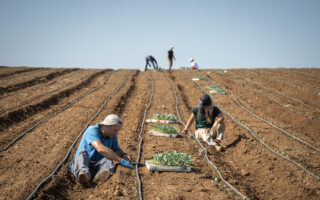As violence grows in West Bank, Israeli military mainly focuses on one kind

The wide-scale Israeli raids in the West Bank overnight from Tuesday into Wednesday stand in stark contrast to Israel’s response to Jewish settler violence in the area, which has surged during the nearly 11-month-long war in the Gaza Strip.
Israel’s military used hundreds of troops to mount the overnight raids in the occupied West Bank in an operation it described as targeting Palestinian militants after months of increasing attacks. At least 10 people have been killed in what an Israeli military official said was a continuing campaign.
By contrast, the military has made a much more muted response to Jewish settler violence against Palestinians, which Israeli officials and the United Nations have also said is on the rise – and some military leaders have said similarly represents a threat to Israel’s national security.
The Israeli military acknowledged Wednesday that it should have acted more quickly to address settler violence during an attack on a Palestinian village this month that stood out for drawing rapid and unusual rebukes from Israeli officials and the international community.
In that attack, on Aug. 15, settlers raided the village of Jit. Palestinians living there described dozens of Israeli settlers storming the village, wearing masks, dressed in dark clothes and armed with rocks, Kalashnikovs and M-16s.
The rioters were eventually dispelled, but not fast enough to prevent damage, injuries and one Palestinian death. “This is a very serious terror incident in which Israelis set out to deliberately harm the residents of the town of Jit, and we failed by not succeeding to arrive earlier to protect them,” Maj. Gen. Avi Bluth, who leads the Israeli military units responsible for the West Bank, said in a report published Wednesday.
The military’s investigation into the attack on Jit found that some soldiers first dispatched to clear out rioters had not acted “decisively” enough, but it noted that additional troops and Israeli Border Police arrived soon after and “rescued and assisted Palestinian families, including women and children, to escape from burning buildings and provided them with first aid.”
The investigation also found that two off-duty members of a nearby rapid response team donned their uniforms and used their authority improperly, noting that they had since been dismissed and their weapons confiscated.
“There is still lots of work ahead of us, and we will be judged by our actions, not our words,” Bluth concluded, adding that the investigation “will not be closed until we bring the perpetrators to justice.”
Many other violent incidents perpetrated by settlers have received less attention.
The United Nations Office for Coordination of Humanitarian Affairs, which tracks West Bank violence on a weekly basis, said Wednesday that in the previous week, Israeli settlers perpetrated more than 30 attacks against Palestinians, resulting in a death, 11 injuries and damage to property, while Palestinians perpetrated one attack against settlers in this period, with no injuries reported. Since the Oct. 7 Hamas-led attack on Israel that set off the war in Gaza, the agency has recorded about 1,270 attacks by Israeli settlers against Palestinians.
The head of Israel’s Shin Bet security agency, Ronen Bar, wrote last week to Prime Minister Benjamin Netanyahu about settler violence as a national security threat. Similarly, in July, Maj. Gen. Yehuda Fuks, in a speech marking his departure as chief of Israel’s Central Command, condemned “nationalist crime” by Israelis in the West Bank, saying that the settler violence imperiled Israel’s security.
More than 2.7 million Palestinians live in the West Bank, alongside about 500,000 Jewish settlers. Israel seized control of the territory from Jordan in 1967 during a war with three Arab states. Israeli Jews have moved in since in increasing numbers, residing there with both tacit and explicit government approval, even though the settlements are considered illegal under international law, and outposts erected without government approval also violate Israeli law.
Palestinians and the international community consider the settlements illegal encroachments on land meant for an eventual Palestinian state. But far-right ministers in Israel’s government – most notably the finance minister, Bezalel Smotrich, and the national security minister, Itamar Ben Gvir, both settlers themselves – have been vocal about wanting to thwart the creation of a Palestinian state and have advanced policies to support the goals of expansionist settlers.
The international community has repeatedly condemned the growth of Israeli settlements and the recent rise in settler violence. The European Union and the United States have in recent months sanctioned individuals and settler groups that they said had violated human rights by acting violently or inciting violence against Palestinians.
On Wednesday, the United States imposed new sanctions on one individual and a group in the West Bank it said was responsible for such violations. “The U.S. continues to take action to promote accountability for those who commit and support extremist violence in the West Bank,” Matthew Miller, a State Department spokesperson, said in a post on social media.
Despite condemning settler violence in response to the riot in Jit, Israel’s prime minister criticized the new sanctions. “Israel views with great severity the sanctioning of Israeli citizens,” Netanyahu’s office said in a statement Wednesday. “The matter is under vigorous discussion with the U.S.”
This article originally appeared in The New York Times.






